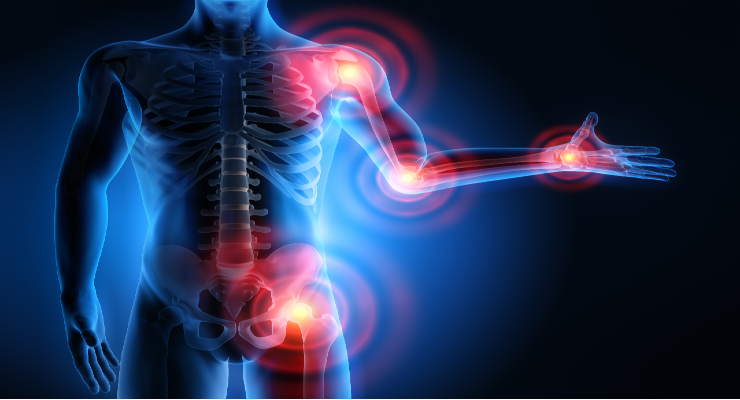Regenerative Therapy for Joint pain/ Arthritis

Symptoms/Complications For individuals struggling with Arthritis and Joint Pain
- Joint pain swelling/ stiffness
- Decrease range of motion
- Skin discoloration near joint
- Noisy joints clicking/grinding or snapping sounds when moving joints
Remember that there are different types of Arthritis such as Osteoarthritis and Rheumatoid Arthritis, each with its unique characteristics and underlying causes, please contact us to see if you or a loved one is a good candidate.
What Is Arthritis?
Arthritis is a condition that affects the joints and causes inflammation, pain, and stiffness
Different types of Arthritis
- Osteoarthritis-
Osteoarthritis, the most prevalent form of arthritis, results from the wear-and-tear of joint cartilage—the tough, smooth coating at the ends of bones forming a joint. This cartilage acts as a cushion for the bones, enabling almost frictionless joint movement. However, significant damage can lead to bones grinding directly against each other, causing pain and limited motion. This deterioration can develop over many years or be accelerated by an injury or infection in the joint.
Additionally, osteoarthritis can lead to alterations in the bone structure and the breakdown of connective tissues that link muscle to bone and stabilize the joint. Severe cartilage damage in a joint might also cause the joint lining to become inflamed and swollen.
- Rheumatoid Arthritis- In rheumatoid arthritis, the body’s immune system attacks the lining of the joint capsule, a tough membrane that encloses all the joint parts. This lining (synovial membrane) becomes inflamed and swollen. The disease process can eventually destroy cartilage and bone within the joint.
What Causes Arthritis ?
There are various types of Arthritis, each with different causes. Risk factors for arthritis may include a family history of the condition, advancing age, and prior joint injuries. The two main types of Arthritis — Osteoarthritis and Rheumatoid Arthritis damage joints in different ways
Causes of Arthritis include
- Family history. Some types of arthritis run in families, so you may be more likely to develop arthritis if your parents or siblings have the disorder.
- Age. The risk of many types of arthritis — including osteoarthritis, rheumatoid arthritis and gout — increases with age.
- Your sex. Women are more likely than men to develop rheumatoid arthritis, while most of the people who have gout, another type of arthritis, are men.
- Previous joint injury. People who have injured a joint, perhaps while playing a sport, are more likely to eventually develop arthritis in that joint.
- Obesity. Carrying excess pounds puts stress on joints, particularly your knees, hips and spine. People with obesity have a higher risk of developing arthritis.
Severe arthritis, especially when it involves the hands or arms, can hinder the performance of daily activities. Arthritis in the joints that bear weight may prevent comfortable walking or maintaining an upright posture. Over time, some joints might slowly deteriorate in alignment and structure.

What are the advantages of treating Arthritis and related conditions with Allogeneic Umbilical Cord Tissue-derived Stem Cells ?
There is no requirement to undergo the process of collecting stem cells from the patient’s hip bone or fat under anesthesia, which can be uncomfortable experience, particularly for smaller children and their parents.
There is a growing body of evidence showing that umbilical cord tissue-derived (HUCT) mesenchymal stem cells are more robust than mesenchymal stem cells from other sources.
There is no requirement to use chemotherapy drugs such as granulocyte-colony stimulating factor (G-CSF or GCSF) to prompt the bone marrow to generate granulocytes and stem cells and to release them into the bloodstream.
Umbilical cord tissue is a rich source of mesenchymal stem cells. And help regenerate and repair damaged tissue cells
Clinical Evidence Around the World
Safety and Improved Abilities
Meet Jeremy, a patient who received stem cell therapy for his Osteoarthritis, please keep in mind that this is one patient’s story, and every case is unique and different to hear more about his story click below
Sucess Stories
FAQs
- Stem cell therapy aims to regrow damaged cartilage in arthritic joints. As we are exploring its potential for treating degenerative conditions like shoulder arthritis.
Successful stem cell therapies have mostly resulted in pain relief and improved function or quality of life. Limited early studies have shown some improvement in new cartilage or bone formation, but the exact mechanisms remain unknown
Although stem cells don’t cure Arthritis they certainly help to regrow and regenerate newer and healthy cells at the site of the injury/damage and help regrow healthy tissue cells
You may be wondering if you or a loved one is a good candidate for a stem cell transplant or cellular therapy procedure. Only your healthcare team can make the final determination. Our expert transplantation team works with you to determine your candidacy. The evaluation process includes many tests. Contact us if you have any questions.
